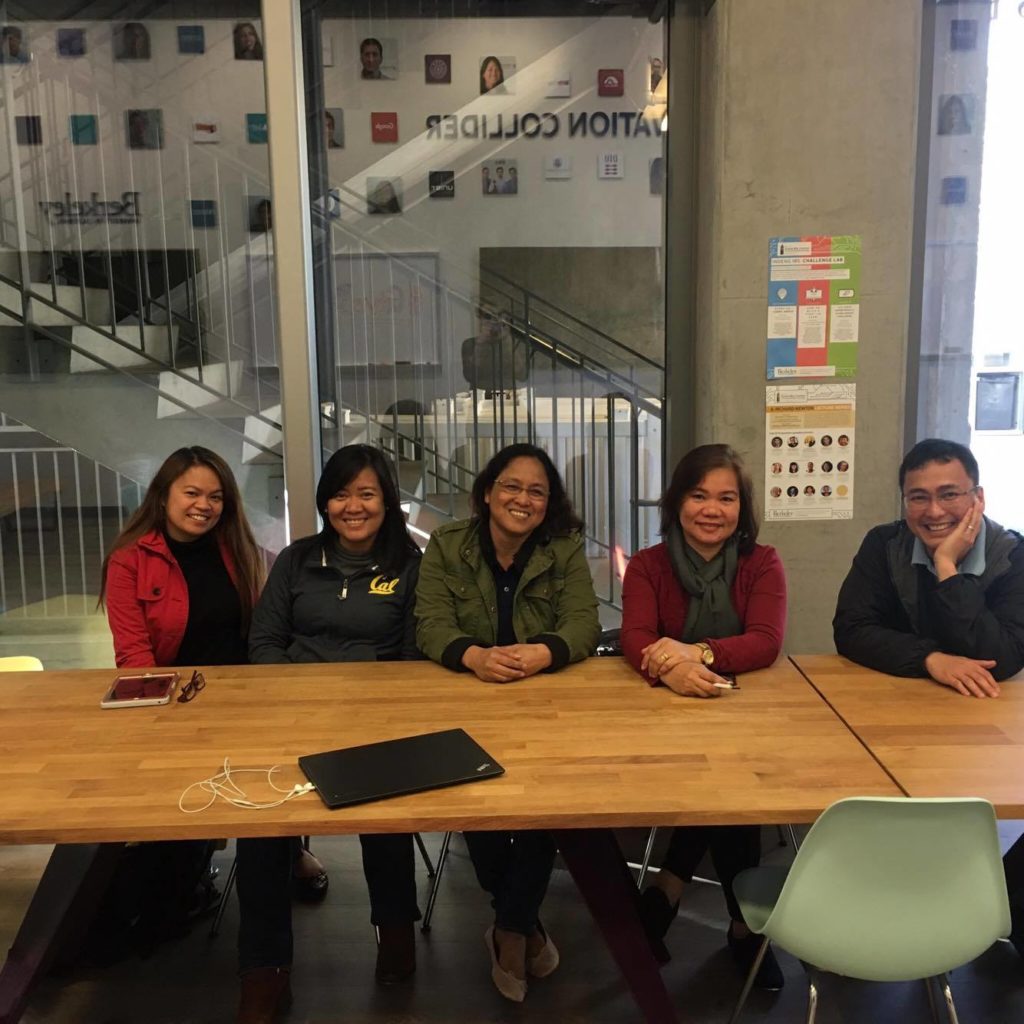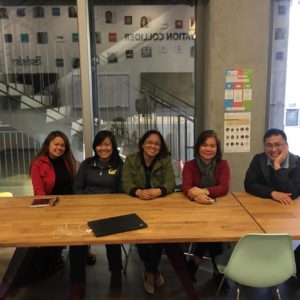The Sutardja Center for Entrepreneurship and Technology is well-known by now for its collaborative approach and collider mentality; one that is based on the principal that creating knowledge societies and bi-directional information exchange is crucial to successful entrepreneurship. Under the Global Partners program, the SCET invites and sends students to various universities and entrepreneurship hubs around the world.
The Philippines was the first Global Partner to be represented at Berkeley through a relationship with the non-profit organization PhilDev. Chief Scientist and Founding Director, Ikhlaq Sidhu, states, “It is our hope that each University can leverage the UC Berkeley ecosystem and that we can support their own, unique, plans to develop globally innovative programs.”
PhilDev is a non-profit working to spark long-term economic growth in the Philippines through strengthening the existing education system, fostering innovation and building an entrepreneurship ecosystem. The institution was formed by Dado Banatao to improve the lives of filipinos. This week, we sat down with some of the visiting professors from PhilDev to learn about them, their goals at Berkeley, and get their opinion of ‘the Berkeley Method’ of entrepreneurship in comparison to the ecosystems they come from.
Matthew Escobido is a core member of the Asian Institute of Management’s faculty, and has extensive experience teachings courses in managerial analytics, technology & innovation strategies, operations management and product design and development. Having worked at Intel and studying at MIT as a design and management fellow, Matthew returned to the Philippines as an educator. Donna Tabangin is a member of the faculty at St. Louis University, the northern most university in Philippines, where she works in the Engineering Urban Planning Research Laboratory (a distinguished research center that aims to promote and sustain competitive research environments through self-motivated faculty and students). Mary Jean Apor is an engineer and professor at Xavier University – Ateneo de Cagayan; she comes from a strong background in electronics and communication, and is studying education and education management, as she, along with the other professors, prepare to share their knowledge of the Berkeley Method of Entrepreneurship back with others in Philippines.
Godelyn Hisole is a faculty of the College of Engineering & Architecture at the Iloilo Science and Technology University. Her current research pursuits are focused on the applications of clean energy. Erees Queen Macabebe, whose research is also centered around renewable energy, teaches at the Ateneo de Manila University in Philippines. After completing her PhD at Nelson Mandela Metropolitan University in Port Elizabeth, South Africa, where her work was focused on photovoltaics (in particular, the investigation of device and performance parameters of solar cells and photovoltaic modules), Erees shifted her focus to furthering knowledge of her research at ADMU, where she had originally received her bachelor’s degree in physics and computer engineering.

The goal of PhilDev, in sending such highly qualified candidates to UC Berkeley is to map the landscape of entrepreneurship, the methods of creating startups, and help spread them in Philippines, in an attempt to increase the knowledge community in the region. Each professor representing their universities was chosen in a highly competitive, geographically informed process so that at the completion of their research and training, PhilDev’s scholars can spread the Berkeley & Silicon Valley Method of Entrepreneurship to as many other academics back home as possible.
In Matthew’s view, the final goal is to begin the process of a long-term “mindset change,” so that driven individuals can come up with and execute better ideas for startups back home. As with a number of countries in South and South East Asia, the “risk appetite of young minds is low, and not too many students are pursuing their own ventures.” Though globalization has brought Philippines the opportunity to send a number of students abroad, the country suffers from the brain-drain dilemma; incentive structures at the moment do not foster the optimal degree of collaboration between departments even within the same university, which is something that really surprised the scholars when they visited Berkeley.
The fact that failure is almost advertised and encouraged in the startup community is something that took PhilDev’s faculty pleasantly by surprise. In their opinion, education elsewhere is largely grade-driven; people are prone to fall victims to a ‘do it big or don’t do it at all’ mentality, whereas the Bay Area offers the ability to iterate and spend time finding the best possible ideas. Even bigger than the mindset in the Bay Area, is its ecosystem. “Though the mindset of people is important, the ecosystem which Berkeley offers is its most prized possession,” Matthew remarked. “The culture of coming up with products, not confining yourselves to a limited role, doesn’t exist anymore – we need to create larger maker spaces, accelerators and design labs to allow people to experiment.”
Only by bringing a new culture of entrepreneurship, PhilDev believes, can Philippines succeed in the startup world. By introducing multidisciplinary initiatives in entrepreneurship, Philippines hopes to incentivize its students to pursue ideas in their home countries, which they hope, will increase the pace of economic development and employment in the region.
The Sutardja Center for Entrepreneurship and Technology is well-known by now for its collaborative approach and collider mentality; one that is based on the principal that creating knowledge societies and bi-directional information exchange is crucial to successful entrepreneurship. Under the Global Partners program, the SCET invites and sends students to various universities and entrepreneurship hubs around the world.
The Philippines was the first Global Partner to be represented at Berkeley through a relationship with the non-profit organization PhilDev. Chief Scientist and Founding Director, Ikhlaq Sidhu, states, “It is our hope that each University can leverage the UC Berkeley ecosystem and that we can support their own, unique, plans to develop globally innovative programs.”
PhilDev is a non-profit working to spark long-term economic growth in the Philippines through strengthening the existing education system, fostering innovation and building an entrepreneurship ecosystem. The institution was formed by Dado Banatao to improve the lives of filipinos. This week, we sat down with some of the visiting professors from PhilDev to learn about them, their goals at Berkeley, and get their opinion of ‘the Berkeley Method’ of entrepreneurship in comparison to the ecosystems they come from.
Matthew Escobido is a core member of the Asian Institute of Management’s faculty, and has extensive experience teachings courses in managerial analytics, technology & innovation strategies, operations management and product design and development. Having worked at Intel and studying at MIT as a design and management fellow, Matthew returned to the Philippines as an educator. Donna Tabangin is a member of the faculty at St. Louis University, the northern most university in Philippines, where she works in the Engineering Urban Planning Research Laboratory (a distinguished research center that aims to promote and sustain competitive research environments through self-motivated faculty and students). Mary Jean Apor is an engineer and professor at Xavier University – Ateneo de Cagayan; she comes from a strong background in electronics and communication, and is studying education and education management, as she, along with the other professors, prepare to share their knowledge of the Berkeley Method of Entrepreneurship back with others in Philippines.
Godelyn Hisole is a faculty of the College of Engineering & Architecture at the Iloilo Science and Technology University. Her current research pursuits are focused on the applications of clean energy. Erees Queen Macabebe, whose research is also centered around renewable energy, teaches at the Ateneo de Manila University in Philippines. After completing her PhD at Nelson Mandela Metropolitan University in Port Elizabeth, South Africa, where her work was focused on photovoltaics (in particular, the investigation of device and performance parameters of solar cells and photovoltaic modules), Erees shifted her focus to furthering knowledge of her research at ADMU, where she had originally received her bachelor’s degree in physics and computer engineering.

The goal of PhilDev, in sending such highly qualified candidates to UC Berkeley is to map the landscape of entrepreneurship, the methods of creating startups, and help spread them in Philippines, in an attempt to increase the knowledge community in the region. Each professor representing their universities was chosen in a highly competitive, geographically informed process so that at the completion of their research and training, PhilDev’s scholars can spread the Berkeley & Silicon Valley Method of Entrepreneurship to as many other academics back home as possible.
In Matthew’s view, the final goal is to begin the process of a long-term “mindset change,” so that driven individuals can come up with and execute better ideas for startups back home. As with a number of countries in South and South East Asia, the “risk appetite of young minds is low, and not too many students are pursuing their own ventures.” Though globalization has brought Philippines the opportunity to send a number of students abroad, the country suffers from the brain-drain dilemma; incentive structures at the moment do not foster the optimal degree of collaboration between departments even within the same university, which is something that really surprised the scholars when they visited Berkeley.
The fact that failure is almost advertised and encouraged in the startup community is something that took PhilDev’s faculty pleasantly by surprise. In their opinion, education elsewhere is largely grade-driven; people are prone to fall victims to a ‘do it big or don’t do it at all’ mentality, whereas the Bay Area offers the ability to iterate and spend time finding the best possible ideas. Even bigger than the mindset in the Bay Area, is its ecosystem. “Though the mindset of people is important, the ecosystem which Berkeley offers is its most prized possession,” Matthew remarked. “The culture of coming up with products, not confining yourselves to a limited role, doesn’t exist anymore – we need to create larger maker spaces, accelerators and design labs to allow people to experiment.”
Only by bringing a new culture of entrepreneurship, PhilDev believes, can Philippines succeed in the startup world. By introducing multidisciplinary initiatives in entrepreneurship, Philippines hopes to incentivize its students to pursue ideas in their home countries, which they hope, will increase the pace of economic development and employment in the region.

